一:编解码原理
1.词典树的结构
| 尾缀字符(suffix) |
|---|
| 母节点(parent) |
| 第一个孩子节点(firstchild) |
| 下一个兄弟节点(nextsibling) |
2.编码原理
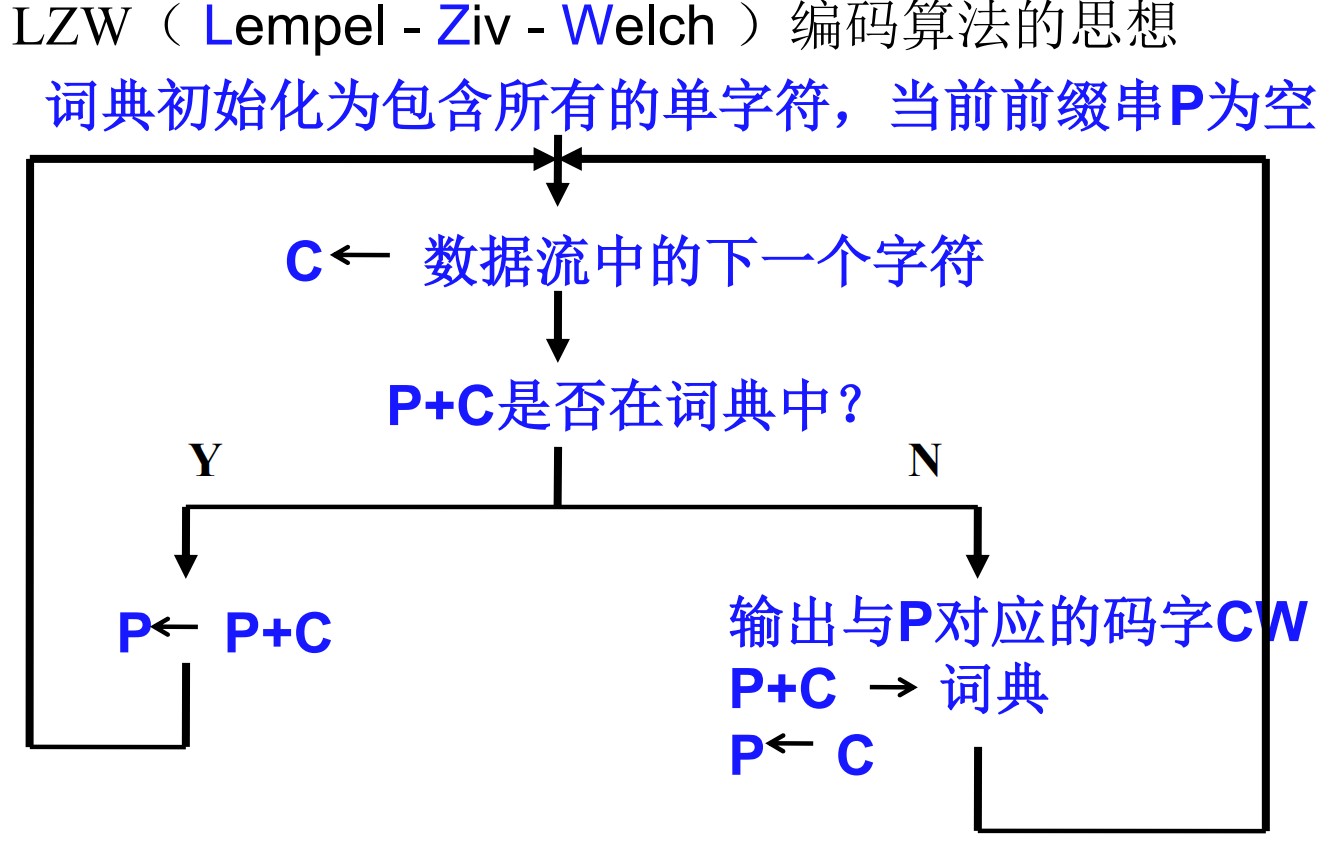
LZW的编码思想是不断地从字符流中提取新的字符串,通俗地理解为新“词条”,然后用“代号”也就是码字表示这个“词条”。这样一来,对字符流的编码就变成了用码字去替换字符流,生成码字流,从而达到压缩数据的目的。LZW编码是围绕称为词典的转换表来完成的。LZW编码器通过管理这个词典完成输入与输出之间的转换。LZW编码器的输入是字符流,字符流可以是用8位ASCII字符组成的字符串,而输出是用n位(例如12位)表示的码字流。LZW编码算法的步骤如下:
步骤1:将词典初始化为包含所有可能的单字符,当前前缀P初始化为空。
步骤2:当前字符C=字符流中的下一个字符。
步骤3:判断P+C是否在词典中
(1)如果“是”,则用C扩展P,即让P=P+C,返回到步骤2。
(2)如果“否”,则
输出与当前前缀P相对应的码字W;
将P+C添加到词典中;
令P=C,并返回到步骤2
3.解码原理
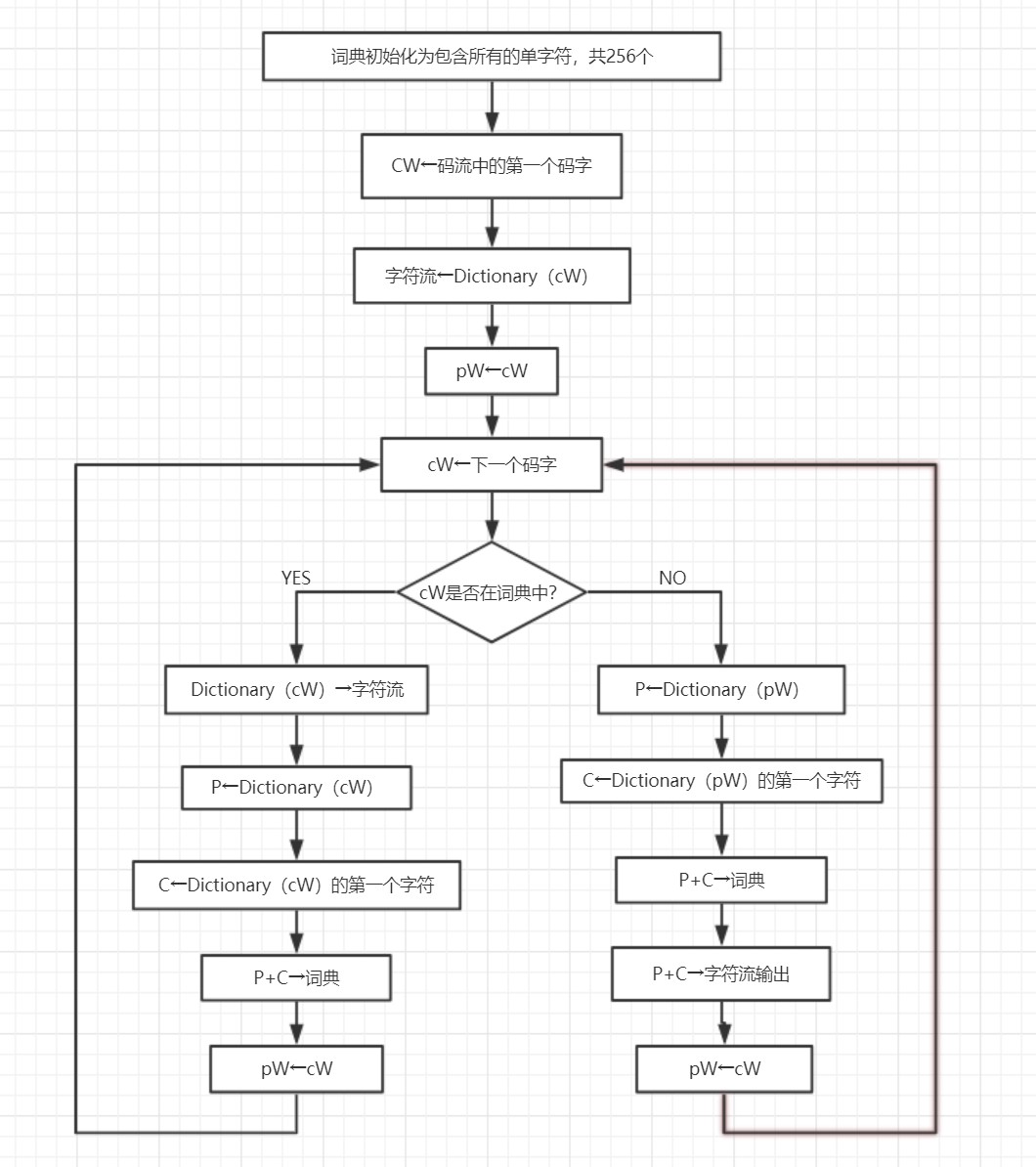
LZW解码算法开始时,译码词典和编码词典相同,包含所有可能的前缀根。具体解码算法如下:
步骤1:在开始译码时词典包含所有可能的前缀根。
步骤2:令CW:=码字流中的第一个码字。
步骤3:输出当前缀-符串string.CW到码字流。
步骤4:先前码字PW:=当前码字CW。
步骤5:当前码字CW:=码字流的下一个码字。
步骤6:判断当前缀-符串string.CW 是否在词典中。
(1)如果”是”,则把当前缀-符串string.CW输出到字符流。
当前前缀P:=先前缀-符串string.PW。
当前字符C:=当前前缀-符串string.CW的第一个字符。
把缀-符串P+C添加到词典。
(2)如果”否”,则当前前缀P:=先前缀-符串string.PW。
当前字符C:=当前缀-符串string.CW的第一个字符。
输出缀-符串P+C到字符流,然后把它添加到词典中。
步骤7:判断码字流中是否还有码字要译。
(1)如果”是”,就返回步骤4。
(2)如果”否”,结束。
二:代码部分
bitio.h
#pragma once
/*
* Declaration for bitwise IO
*
* vim: ts=4 sw=4 cindent
*/
#ifndef __BITIO__
#define __BITIO__
#include <stdio.h>
typedef struct {
FILE *fp;
unsigned char mask;
int rack;
}BITFILE;
BITFILE *OpenBitFileInput(char *filename);
BITFILE *OpenBitFileOutput(char *filename);
void CloseBitFileInput(BITFILE *bf);
void CloseBitFileOutput(BITFILE *bf);
int BitInput(BITFILE *bf);
unsigned long BitsInput(BITFILE *bf, int count);
void BitOutput(BITFILE *bf, int bit);
void BitsOutput(BITFILE *bf, unsigned long code, int count);
#endif // __BITIO__bitio.cpp
/*
* Definitions for bitwise IO
*
* vim: ts=4 sw=4 cindent
*/
#include <stdlib.h>
#include <stdio.h>
#include "bitio.h"
//打开输入文件
BITFILE *OpenBitFileInput(char *filename) {
BITFILE *bf;
bf = (BITFILE *)malloc(sizeof(BITFILE));
if (NULL == bf) return NULL;
if (NULL == filename) bf->fp = stdin;
//else bf->fp = fopen(filename, "rb");
else
fopen_s(&(bf->fp), filename, "rb");
if (NULL == bf->fp) return NULL;
bf->mask = 0x80;
bf->rack = 0;
return bf;
}
//打开输出文件
BITFILE *OpenBitFileOutput(char *filename) {
BITFILE *bf;
bf = (BITFILE *)malloc(sizeof(BITFILE));
if (NULL == bf) return NULL;
if (NULL == filename) bf->fp = stdout;
//else bf->fp = fopen(filename, "wb");
else
fopen_s(&(bf->fp), filename, "wb");
if (NULL == bf->fp) return NULL;
bf->mask = 0x80;
bf->rack = 0;
return bf;
}
void CloseBitFileInput(BITFILE *bf) {
fclose(bf->fp);
free(bf);
}
void CloseBitFileOutput(BITFILE *bf) {
// Output the remaining bits
if (0x80 != bf->mask) fputc(bf->rack, bf->fp);
fclose(bf->fp);
free(bf);
}
int BitInput(BITFILE *bf) {
int value;
if (0x80 == bf->mask) {
bf->rack = fgetc(bf->fp);
if (EOF == bf->rack) {
fprintf(stderr, "Read after the end of file reachedn");
exit(-1);
}
}
value = bf->mask & bf->rack;
bf->mask >>= 1;
if (0 == bf->mask) bf->mask = 0x80;
return((0 == value) ? 0 : 1);
}
unsigned long BitsInput(BITFILE *bf, int count) {
unsigned long mask;
unsigned long value;
mask = 1L << (count - 1);
value = 0L;
while (0 != mask) {
if (1 == BitInput(bf))
value |= mask;
mask >>= 1;
}
return value;
}
void BitOutput(BITFILE *bf, int bit) {
if (0 != bit) bf->rack |= bf->mask;
bf->mask >>= 1;
if (0 == bf->mask) { // eight bits in rack
fputc(bf->rack, bf->fp);
bf->rack = 0;
bf->mask = 0x80;
}
}
void BitsOutput(BITFILE *bf, unsigned long code, int count) {
unsigned long mask;
mask = 1L << (count - 1);
while (0 != mask) {
BitOutput(bf, (int)(0 == (code&mask) ? 0 : 1));
mask >>= 1;
}
}
#if 0
int main(int argc, char **argv) {
BITFILE *bfi, *bfo;
int bit;
int count = 0;
if (1 < argc) {
if (NULL == OpenBitFileInput(bfi, argv[1])) {
fprintf(stderr, "fail open the filen");
return -1;
}
}
else {
if (NULL == OpenBitFileInput(bfi, NULL)) {
fprintf(stderr, "fail open stdinn");
return -2;
}
}
if (2 < argc) {
if (NULL == OpenBitFileOutput(bfo, argv[2])) {
fprintf(stderr, "fail open file for outputn");
return -3;
}
}
else {
if (NULL == OpenBitFileOutput(bfo, NULL)) {
fprintf(stderr, "fail open stdoutn");
return -4;
}
}
while (1) {
bit = BitInput(bfi);
fprintf(stderr, "%d", bit);
count++;
if (0 == (count & 7))fprintf(stderr, " ");
BitOutput(bfo, bit);
}
return 0;
}
#endif
LZW_E.cpp
/*
* Definition for LZW coding
*
* vim: ts=4 sw=4 cindent nowrap
*/
#include <stdlib.h>
#include <stdio.h>
#include "bitio.h"
#define MAX_CODE 65535
struct
{
int suffix;
int parent, firstchild, nextsibling;
} dictionary[MAX_CODE + 1];
int next_code;
int d_stack[MAX_CODE]; // stack for decoding a phrase
#define input(f) ((int)BitsInput( f, 16))
#define output(f, x) BitsOutput( f, (unsigned long)(x), 16)
int DecodeString(int start, int code);
void InitDictionary(void);
void PrintDictionary(void)
{
int n;
int count;
for (n = 256; n < next_code; n++) {
count = DecodeString(0, n);
printf("%4d->", n);
while (0 < count--) printf("%c", (char)(d_stack[count]));
printf("n");
}
}
int DecodeString(int start, int code) {
int count;
count = start;
while (0 <= code) {
d_stack[count] = dictionary[code].suffix;
code = dictionary[code].parent;
count++;
}
return count;
}
//初始化词典
void InitDictionary(void) {
int i;
for (i = 0; i < 256; i++) {
dictionary[i].suffix = i;
dictionary[i].parent = -1;
dictionary[i].firstchild = -1;
dictionary[i].nextsibling = i + 1;
}
dictionary[255].nextsibling = -1;
next_code = 256; //定义新词的位置
}
/*
* Input: string represented by string_code in dictionary,
* Output: the index of character+string in the dictionary
* index = -1 if not found
*/
int InDictionary(int character, int string_code) {
int sibling;
if (0 > string_code) return character;
sibling = dictionary[string_code].firstchild; //寻找第一个孩子节点
while (-1 < sibling) {
if (character == dictionary[sibling].suffix) return sibling;
sibling = dictionary[sibling].nextsibling;
}
return -1;
}
void AddToDictionary(int character, int string_code) //将新的字符串加入到词典内
{
int firstsibling, nextsibling;
if (0 > string_code) return;
dictionary[next_code].suffix = character; //当前尾缀字符为character
dictionary[next_code].parent = string_code; //母节点为string_code
dictionary[next_code].nextsibling = -1; //无下一个兄弟节点
dictionary[next_code].firstchild = -1; //无第一个孩子节点
firstsibling = dictionary[string_code].firstchild; //查找母节点string_code的第一个孩子节点
if (-1 < firstsibling) { // the parent has child
nextsibling = firstsibling;
while (-1 < dictionary[nextsibling].nextsibling)
nextsibling = dictionary[nextsibling].nextsibling;
dictionary[nextsibling].nextsibling = next_code;
}
else {// no child before, modify it to be the first
dictionary[string_code].firstchild = next_code;
}
next_code++;
}
void LZWEncode(FILE *fp, BITFILE *bf) {
int character;
int string_code;
int index;
unsigned long file_length;
fseek(fp, 0, SEEK_END);
file_length = ftell(fp); //读取源文件的长度
fseek(fp, 0, SEEK_SET); //指回源文件开头
BitsOutput(bf, file_length, 4 * 8); //写文件长度
InitDictionary(); //初始化词典
string_code = -1;
while (EOF != (character = fgetc(fp)))
{
index = InDictionary(character, string_code); //index=-1时,string+character不在词典内
if (0 <= index) { // string+character in dictionary
string_code = index;
}
else { // string+character not in dictionary
output(bf, string_code);
if (MAX_CODE > next_code) { // free space in dictionary
// add string+character to dictionary
AddToDictionary(character, string_code); //写入新词
}
string_code = character; //string_code重新赋值为character,开始下一个词的编码
}
}
output(bf, string_code);
}
void LZWDecode(BITFILE *bf, FILE *fp) {
int character;
int new_code, last_code;
int phrase_length;
unsigned long file_length;
file_length = BitsInput(bf, 4 * 8); //写文件长度
if (-1 == file_length) file_length = 0;
InitDictionary(); //初始化词典树
last_code = -1;
while (0 < file_length)
{
new_code = input(bf);
if (new_code >= next_code) //不在词典内
{ // this is the case CSCSC( not in dict)
d_stack[0] = character;
phrase_length = DecodeString(1, last_code);
}
else
{
phrase_length = DecodeString(0, new_code);
}
character = d_stack[phrase_length - 1];
while (0 < phrase_length)
{
phrase_length--;
fputc(d_stack[phrase_length], fp);
file_length--;
}
if (MAX_CODE > next_code)
{ // add the new phrase to dictionary
AddToDictionary(character, last_code);
}
last_code = new_code;
}
}
int main(int argc, char **argv) {
FILE *fp; //输入
BITFILE *bf; //输出
//argv[2]原始文件
//argv[3]生成目标文件
if (4 > argc)
{
fprintf(stdout, "usage: n%s <o> <ifile> <ofile>n", argv[0]);
fprintf(stdout, "t<o>: E or D reffers encode or decoden");
fprintf(stdout, "t<ifile>: input file namen");
fprintf(stdout, "t<ofile>: output file namen");
return -1;
}
//argv[1][0]='E',编码
if ('E' == argv[1][0])// do encoding
{
errno_t err = 0;
err = fopen_s(&fp, argv[2], "rb");
bf = OpenBitFileOutput(argv[3]);
if (fp == NULL)
{
printf("pf is NULL");
return 0;
}
if (bf == NULL)
{
printf("bf is NULL");
return 0;
}
printf("encodingn");
if (NULL != fp && NULL != bf)
{
LZWEncode(fp, bf);
fclose(fp);
CloseBitFileOutput(bf);
fprintf(stdout, "encoding donen");
}
else
printf("error");
}
//argv[1][0]='D',解码
else if ('D' == argv[1][0])
{ // do decoding
bf = OpenBitFileInput(argv[2]);
//fp = fopen(argv[3], "wb");
errno_t err = 0;
err = fopen_s(&fp, argv[3], "wb");
if (fp == NULL)
{
printf("pf is NULL");
return 0;
}
if (bf == NULL)
{
printf("bf is NULL");
return 0;
}
printf("decodingn");
if (NULL != fp && NULL != bf) {
LZWDecode(bf, fp);
fclose(fp);
CloseBitFileInput(bf);
fprintf(stdout, "decoding donen");
}
}
else { // otherwise
fprintf(stderr, "not supported operationn");
}
return 0;
}
三:运行结果
对十种不同格式的文件分别进行编解码
原始文件:
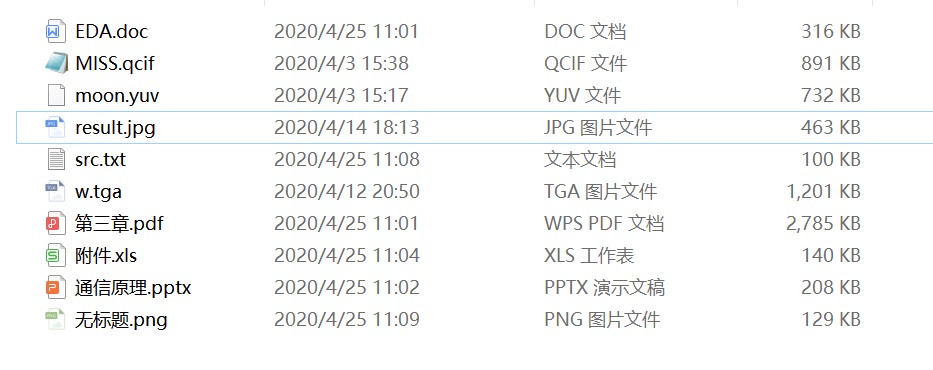 编码后生成文件
编码后生成文件
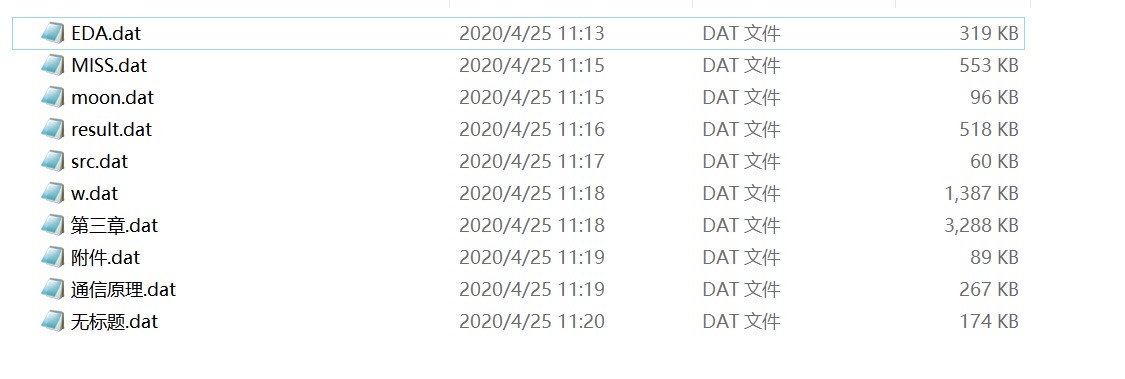
解码后生成文件
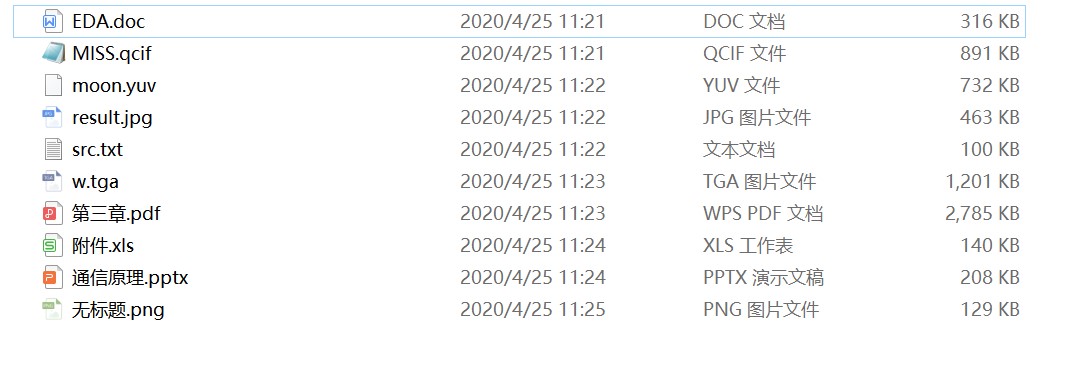
| 原始文件格式 | 原始文件大小 | 编码后文件大小 | 压缩比 |
|---|---|---|---|
| doc | 316KB | 319KB | 0.991 |
| qcif | 891KB | 553KB | 1.611 |
| yuv | 732KB | 96KB | 7.625 |
| jpg | 463KB | 518KB | 0.894 |
| txt | 100KB | 60KB | 1.667 |
| tga | 1201KB | 1387KB | 0.866 |
| 2785KB | 3288KB | 0.847 | |
| xls | 140KB | 89KB | 1.573 |
| pptx | 208KB | 267KB | 0.779 |
| png | 129KB | 174KB | 0.741 |
通过对十种不同格式的文件进行LZW编码,发现并不是所有文件编码后都会得到压缩,有些文件反而会更大。
最后
以上就是爱笑小鸽子最近收集整理的关于LZW编解码算法实现与分析实验报告的全部内容,更多相关LZW编解码算法实现与分析实验报告内容请搜索靠谱客的其他文章。








发表评论 取消回复